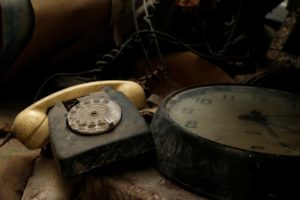The Atlantic | August 12, 2017
People are talking about thermonuclear war again—and they’re out of practice.

Opening their paper on Friday morning, readers of The Wall Street Journal encountered a financial item of unusually wide interest. “Here’s a question that’s probably not on the CFA exam,” write Mike Bird and Riva Gold. “What happens to financial markets if two nuclear-armed nations go to war?”
What, indeed? We soon learn the consequences could be dire. Short-term interest rates would rise and long-term rates would fall. In a small skirmish between North Korea and the United States, the S&P 500 Index might post 20-percent losses “before it became clear that the U.S. would prevail.” But were another nuclear-armed power like Russia or China to get involved, the European Central Bank would have to take extreme action and issue “highly dovish forward guidance.”
Yet even amid this market turmoil, the savvy broker might still protect their investment. Sure, it’s true that the Japanese yen—a traditional safe haven—makes for a tricky bet when Tokyo is 800 miles downwind of Pyongyang. But there’s at least one good option left, according to analysts at the Nordea Group:
German bunds, the perennial refuge of panicked investors, would be good to own during a nuclear conflict too, with aggressive buying pushing the spread between German two and 10-year bunds to 0.5 percentage point, from above one percentage point now.
At last, a good spread between German bonds.
Then the president spoke. At an unrelated event at his private golf course in New Jersey, President Donald Trump warned of “fire and fury like the world has never seen” if North Korea continued to make threats against the United States. The next day—after aides tried to signal that his comments were improvised—he repeated them, saying maybe “fire and fury” was not “tough enough.”
She said she felt glad there was renewed interest in the one technology that hangs over all U.S. international relations. But she also worried at how reactive the attention seemed. For the past week, she told me, she’s heard one constant question during TV and radio interviews: “Should we be concerned?”
Americans flunk questions about basic nuclear security, Karl said, “such as identifying nuclear states, the scale of nuclear arsenals, etc.” Younger Americans also have little experience with nuclear weapons, especially compared with Baby Boomers.
Alex Wellerstein, a historian of nuclear weapons, also at the Stevens Institute, agreed that people seem more interested now. But he worries that they won’t stay that way once this crisis passes.
“It’s clear there is a sharp uptick of interest on nuclear questions,” he said in an email. “The question is, what kind of interest is it? Is it the kind of interest that will lead to a more sustained public interest on these topics? Or is it an ephemeral fear of the sort that comes and goes in a crisis?”
“American nuclear anxiety seems almost totally focused on foreign policy issues from small states—specifically Iran and North Korea. In that sense it is somewhat different than the period of the Cold War when the threat was much larger,” he said:
What I fear is that Americans will erroneously think that a war with either Iran or North Korea would be ‘no big deal’ whereas we are (and were) much more aware that a war with Russia was totally unthinkable. War with Iran should be considered unthinkable (one need only look what our war with Iraq has cost us, what monsters it created), and war with North Korea would come at a dearer cost than I think most people appreciate.
But when it comes to the prospect of nuclear annihilation, what is unthinkable and what isn’t? Americans are finding themselves back in the uneasy practice of imagining not the end of the world, but all the intermediate steps between now and then—the first warnings on the news, the orange streaks in the sky, the agony of waiting for ignition.
Writing three decades ago, the essayist and physician Lewis Thomas imagined a war with Russia and fell into despair. “My mind swarms with images of a world in which the thermonuclear bombs have begun to explode, in New York and San Francisco, in Moscow and Leningrad, in Paris, in Paris, in Paris. In Oxford and Cambridge, in Edinburgh,” he wrote:
This is a bad enough thing for the people in my generation. We can put up with it, I suppose, since we must.
What I cannot imagine, what I cannot put up with … is what it would be like to be young. How do the young stand it? How can they keep their sanity? If I were very young, sixteen or seventeen years old, I think I would begin, perhaps very slowly and imperceptibly, to go crazy.
For today’s young people, looking to an uncertain future, there are German bonds to buy.